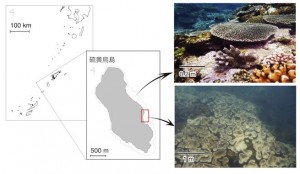Elevated ocean CO2 may favor soft corals Differing acidification tolerance may cause coral reef community shift

A spatial community shift from hard to soft corals in a volcanically acidified area was observed at Iwotorishima Island, Okinawa, Japan by graduate student Shihori Inoue and colleagues at the Department of Earth and Planetary Science in the Graduate School of Science. Taking into consideration the high tolerance of soft corals to high CO2 confirmed by culture experiments, ocean acidification is inferred to be the cause of a community shift from hard to soft corals in future coral reefs.

c Shihori Inoue. Iwotorishima Island location and spatial community shift in corals. Above: hard corals predominate in low CO2 concentration areas (300-400 μ atm (ppm)). Below: soft corals predominate in high CO2 concentration areas (800-1000 μ atm).
The effects of ocean acidification on coral reef organisms have been mainly studied in tank experiments. The full complexity of in situ oceanographic conditions and community processes, however, cannot be recreated in laboratory experiments, and this makes it difficult to apply experimental results to field conditions. Observations of spatial community shifts under naturally high pCO2 conditions such as at Iwotorishima Island can provide information on the relationship of community structure to pCO2 levels. However, coral reefs in such locations are rare, and other than the current example there has been only one example of natural CO2 vents in Papua New Guinea.
Additionally, most projected community changes due to ocean acidification describe transitions from hard coral to non-calcifying macroalgal communities; other organisms have received less attention, despite the biotic diversity of coral reef communities. The present study shows a new community shift from hard to soft corals.
Hard corals have an important task supporting biodiversity and as natural breakwater, but if ocean acidification continues they may be replaced by soft corals with ensuing environmental problems.
Press release (Japanese)
Paper
Shihori Inoue,Hajime Kayanne,Shoji Yamamoto, Haruko Kurihara,
“Spatial community shift from hard to soft corals in acidified water” ,
Nature Climate Change (in press) Online Edition: 2013/3/24 ,doi:10.1038/nclimate1855
Article link
リンク
Department of Earth and Planetary Science, Graduate School of Science







